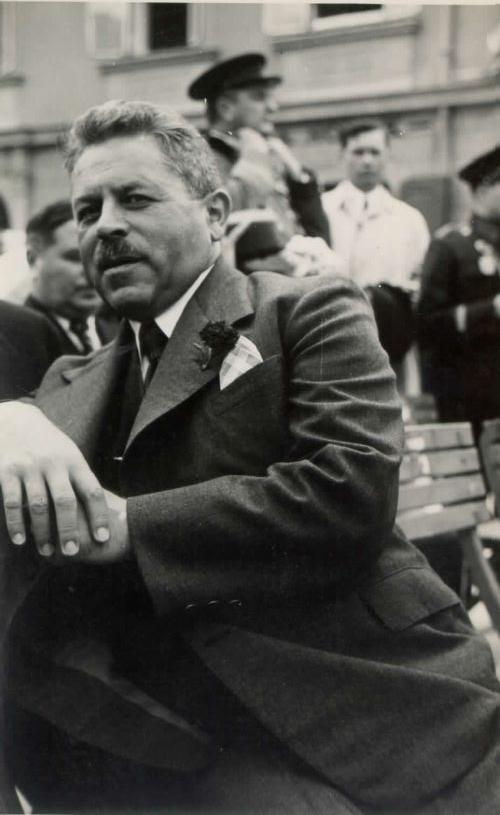|
Marko Natlačen
Marko Natlačen (24 April 1886 – 13 October 1942) was a Slovenian politician and jurist, who also served as the last ban (governor) of the Drava Banovina in the Kingdom of Yugoslavia. His assassination at the hands of the Slovenian Communist secret police (VOS) during World War II was an important event in the escalation of the armed conflict between the Slovenian partisans and the Slovenian anti-revolutionary forces in the Province of Ljubljana. The role of Natlačen during World War II and the extent to which he collaborated with the Fascist Italian forces has been disputed. Biography Natlačen was born in the village of Manče in the upper Vipava Valley, in what was then the Duchy of Carniola within the Austro-Hungarian Empire. Natlačen finished his law studies in Vienna and then moved to Ljubljana, where he worked in a law firm. He was a member of the Slovene People's Party and an anticommunist. During the Second World War he founded the National Council of Slovenia ( s ... [...More Info...] [...Related Items...] OR: [Wikipedia] [Google] [Baidu] |
Marko Natlačen 1939
Marko may refer to: * Marko (given name) * Marko (surname) * Márkó, a village in Hungary See also *Marco (other) *Markko (other) *Marka (other) *Markov *Marku * * {{disambiguation, surname ... [...More Info...] [...Related Items...] OR: [Wikipedia] [Google] [Baidu] |
Anticommunist
Anti-communism is political and ideological opposition to communism. Organized anti-communism developed after the 1917 October Revolution in the Russian Empire, and it reached global dimensions during the Cold War, when the United States and the Soviet Union engaged in an intense rivalry. Anti-communism has been an element of movements which hold many different political positions, including conservatism, fascism, liberalism, nationalism, social democracy, libertarianism, or the anti-Stalinist left. Anti-communism has also been expressed in philosophy, by several religious groups, and in literature. Some well-known proponents of anti-communism are former communists. Anti-communism has also been prominent among movements resisting communist governance. The first organization which was specifically dedicated to opposing communism was the Russian White movement which fought in the Russian Civil War starting in 1918 against the recently established Bolshevik government. The W ... [...More Info...] [...Related Items...] OR: [Wikipedia] [Google] [Baidu] |
People From The Municipality Of Vipava
A person ( : people) is a being that has certain capacities or attributes such as reason, morality, consciousness or self-consciousness, and being a part of a culturally established form of social relations such as kinship, ownership of property, or legal responsibility. The defining features of personhood and, consequently, what makes a person count as a person, differ widely among cultures and contexts. In addition to the question of personhood, of what makes a being count as a person to begin with, there are further questions about personal identity and self: both about what makes any particular person that particular person instead of another, and about what makes a person at one time the same person as they were or will be at another time despite any intervening changes. The plural form "people" is often used to refer to an entire nation or ethnic group (as in "a people"), and this was the original meaning of the word; it subsequently acquired its use as a plural form of per ... [...More Info...] [...Related Items...] OR: [Wikipedia] [Google] [Baidu] |
1942 Deaths
Year 194 ( CXCIV) was a common year starting on Tuesday (link will display the full calendar) of the Julian calendar. At the time, it was known as the Year of the Consulship of Septimius and Septimius (or, less frequently, year 947 ''Ab urbe condita''). The denomination 194 for this year has been used since the early medieval period, when the Anno Domini calendar era became the prevalent method in Europe for naming years. Events By place Roman Empire * Emperor Septimius Severus and Decimus Clodius Septimius Albinus Caesar become Roman Consuls. * Battle of Issus: Septimius Severus marches with his army (12 legions) to Cilicia, and defeats Pescennius Niger, Roman governor of Syria. Pescennius retreats to Antioch, and is executed by Severus' troops. * Septimius Severus besieges Byzantium (194–196); the city walls suffer extensive damage. Asia * Battle of Yan Province: Warlords Cao Cao and Lü Bu fight for control over Yan Province; the battle lasts for over 100 ... [...More Info...] [...Related Items...] OR: [Wikipedia] [Google] [Baidu] |
1886 Births
Events January–March * January 1 – Upper Burma is formally annexed to British Burma, following its conquest in the Third Anglo-Burmese War of November 1885. * January 5– 9 – Robert Louis Stevenson's novella ''Strange Case of Dr Jekyll and Mr Hyde'' is published in New York and London. * January 16 – A resolution is passed in the German Parliament to condemn the Prussian deportations, the politically motivated mass expulsion of ethnic Poles and Jews from Prussia, initiated by Otto von Bismarck. * January 18 – Modern field hockey is born with the formation of The Hockey Association in England. * January 29 – Karl Benz patents the first successful gasoline-driven automobile, the Benz Patent-Motorwagen (built in 1885). * February 6– 9 – Seattle riot of 1886: Anti-Chinese sentiments result in riots in Seattle, Washington. * February 8 – The West End Riots following a popular meeting in Trafalgar Square, London. * F ... [...More Info...] [...Related Items...] OR: [Wikipedia] [Google] [Baidu] |


_1938.jpg)
